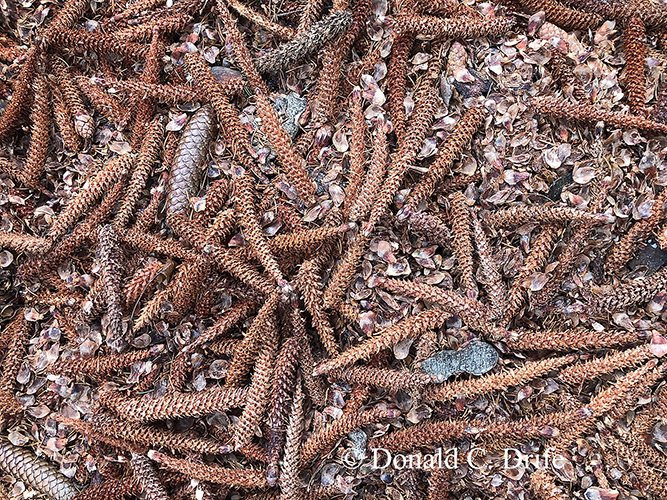Squirrel middens are interesting, but they are often overlooked by casual observers. The word midden means “refuse heap” and is a term that naturalists borrowed from archeology. Originally the term was “kitchen midden” referring to places that humans discarded bones, seeds, food scraps and even broken pottery.

Recently, I noticed a pile of Norway Spruce (Picea abies) cone “cobs” and scales. An Eastern Gray Squirrel (Sciurus carolinensis) perched on a branch stub about 30 feet off the ground. She sat with her back to the trunk and dropped cone “cobs” and scales forming a large pile. She must feel safe here and returned frequently to eat. The midden comprised several hundred “cobs” and thousands of cone scales making a pile on the ground 10 inches deep and three feet in diameter. I poked through the pile and I discovered no missed seeds. This is the largest Gray Squirrel midden I have ever found. The cones were collected off the ground or cut out of the tree. Gray Squirrels spread their food hoarding over a wide area because they bury nuts individually. This results in smaller middens.
Red Squirrel (Tamiasciurus hudsonicus) middens are typically larger than Gray Squirrel middens. Red Squirrels store their winter food in caches in hollow spaces in trees or, unfortunately, in buildings. Their middens can accumulate in a local area all winter and sometimes are the refuse from several squirrels. The largest one in my field notes was 5 feet in diameter and three feet deep. It was several layers deep and appeared to have accumulated over at least three winters.
Now is a good time to look for squirrels forming middens. If you are lucky, you might find a squirrel feeding and adding to a midden. They are fun to watch.
Copyright 2020 by Donald Drife
Webpage Michigan Nature Guy
Follow MichiganNatureGuy on Facebook
